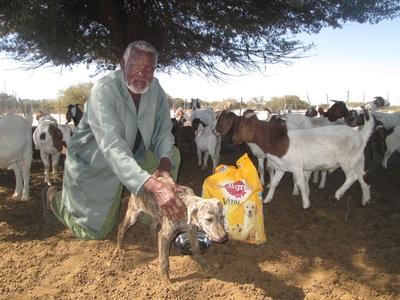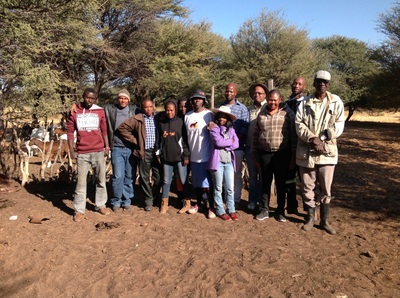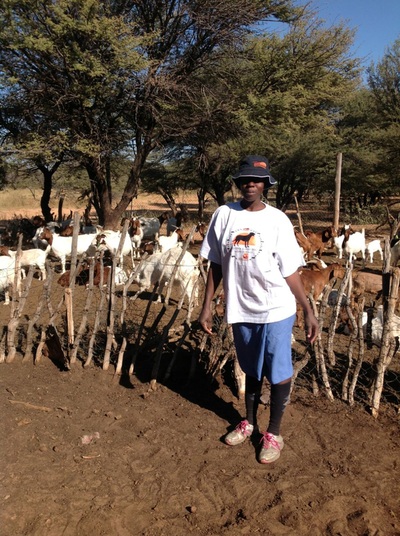Ms. Naomi Torumba’s is a small stock farmer and a beneficiary of the LSGD program as well. In 2011, she started her farming endeavour with 25 goats funded through the government’s LIMID program. Naomi said she was lucky to know about CCB’s LSGD program only a year after receiving funding as this helped her lot to manage her livestock better. She got her first dog from CCB in 2012 and it was found dead in the veldt from what was suspected to be poisoning. She called CCB again in 2014 to request for another dog which is now doing very well. “Currently, I am a proud owner of 53 herds of goats, a healthy guarding dog and through my small stock production, I was able to build my family a house in Karakubis, sold some goats to electrify my house and also buy livestock vaccines’’. ‘’My livestock productivity increased tremendously after placing a livestock guarding dog. It is very important to stay closer to livestock as it can minimizes the chances of theft and other possible livestock losses which may result from the owner being far at all times’’, Naomi pointed out. Ms. Torumba added that her commitment in livestock management inspired other people in her area so much that they have now started placing dogs on their own while others call CCB for assistance in this regard.
|
Two beneficiaries of CCB livestock guarding dogs (LSGD) are reaping the rewards of using LSGD’s as a non lethal predator deterrent. Mr. Haube is a farmer in the Ghanzi region who owns herds of goats and cattle. He is happy to have been given a dog that he uses to protect his goats from predators. He points out that, “If you own a herd of goats or flock of sheep, you will need to protect your animals from predators, thieves and other unwanted elements. If you use poisons or traps, your animals (herd) may end up being casualties’’. So, he considers safer alternatives and one of such alternative is a guarding dog. He expressed that he is very thankful and very privileged to have given a dog by CCB. “Having a livestock guarding dog around my farm is a good, safe and a cheaper/reliable method compared to using a herder or other methods to protect my animals. Such a dog would always stay with my herd; watch out for predators and other intruders and fight fiercely to protect my livestock. I am looking forward to seeing my herd multiple, hence making more profit from this business of livestock farming’’, Mr. Haube commented happily. Ms. Naomi Torumba’s is a small stock farmer and a beneficiary of the LSGD program as well. In 2011, she started her farming endeavour with 25 goats funded through the government’s LIMID program. Naomi said she was lucky to know about CCB’s LSGD program only a year after receiving funding as this helped her lot to manage her livestock better. She got her first dog from CCB in 2012 and it was found dead in the veldt from what was suspected to be poisoning. She called CCB again in 2014 to request for another dog which is now doing very well. “Currently, I am a proud owner of 53 herds of goats, a healthy guarding dog and through my small stock production, I was able to build my family a house in Karakubis, sold some goats to electrify my house and also buy livestock vaccines’’. ‘’My livestock productivity increased tremendously after placing a livestock guarding dog. It is very important to stay closer to livestock as it can minimizes the chances of theft and other possible livestock losses which may result from the owner being far at all times’’, Naomi pointed out. Ms. Torumba added that her commitment in livestock management inspired other people in her area so much that they have now started placing dogs on their own while others call CCB for assistance in this regard.
0 Comments
|
SearchArchives
May 2024
Categories |




 RSS Feed
RSS Feed
